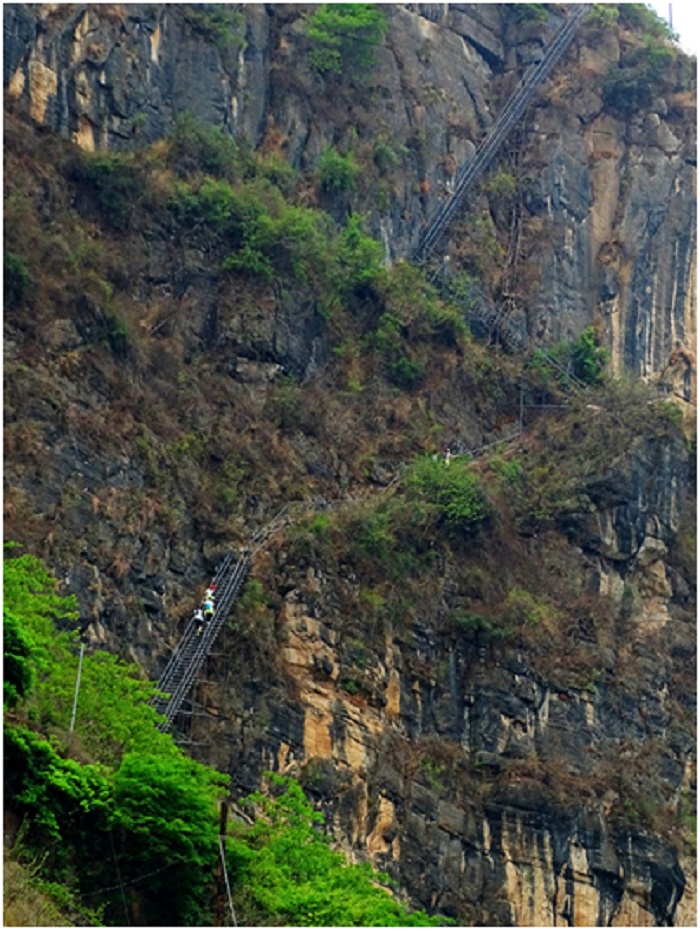



Atulie’er village in southwest China’s Sichuan province, known as a “cliff village” as it is perched on an 800-meter-high cliff, has become an Internet-famous tourist attraction.
In the past, residents of Atulie’er village lived in poverty and had to use a series of rattan ladders to scale the cliff, which could be very dangerous.
At the end of 2016, the local government invested over one million yuan ($150,000) in building a 2,556-step and nearly 3-km-long steel ladder, making it safer for villagers to climb up and down the cliff.
Since then, the “cliff village” located in Zhaojue county, Liangshan Yi autonomous prefecture of Sichuan province, has seen steady improvement in its infrastructure.
After being covered by 5G signals, Atulie’er village has become more widely known through live-streaming shows and seen a growing number of tourists. Even the steel ladder becomes a must-see tourist spot.
“Before the National Day holiday in last October, officials of our village encouraged me to open a diner. I did and earned 1,000 yuan per day by selling bean jelly, cold noodles, and fried potatoes during the holiday,” a resident in Atulie’er village said happily.
Under the guidance of poverty-relief officials, more and more people in Atulie’er village have opened agritainment restaurants and shops.
Recently, Mou’se Subure, a resident in Atulie’er village who has already been relocated to a new community at the county seat last May, has been busy building a new house above the cliff.
Mou’se spends eight hours climbing up and down the steel ladder every day to carry construction materials such as cement and PVC tiles to the village.
“I want to build a homestay hotel for tourists in the village,” he explained, adding that he is living a comfortable life in the new community down the cliff.
“My new home has three bedrooms. There’s even a study room for my children,” he said. With the help of the local government, he only spent less than 10,000 yuan on his new home, which has various domestic appliances, including flat TV, induction cooker and washing machine.
The new community is clean, well lit at night, and equipped with shops and schools, he said, noting that it is much better than the adobe houses above the cliff.
Back in May 2020, all the 84 poor households of Atulie’er village were relocated to new houses at a resettlement site down the cliff. Villagers received vocational training and secured jobs in the downtown area of the county, gradually becoming better-off.
After being relocated, many villagers have turned their old adobe houses into hotels, and provided them to tourists at a price of 50 yuan for each room per day. However, the adobe houses are normally vulnerable to the rain and wind and most of them don’t have cement floor.
“I will lay two layers of PVC tiles on the roof of the house and pave the floor with cement so that the house is warm in winter and cool in summer,” Mou’se told People’s Daily, describing a new hotel that will soon be completed.
According to Mou’se, he and five other households plan to run the hotel together. “We will build three rooms first and make them available to visitors before the Spring Festival,” he said.
Although he just shook off poverty in 2020, Mou’se isn’t worried about the money for building the hotel at all.
“Last April, I bought over 70 lambs and now have a total of 120 sheep if counting all the newborn,” Mou’se said, referring to a flock of sheep in the mountains of the village.
This batch of sheep has been ordered by a company, which is expected to bring a net income of over 40,000 yuan to his family.
Besides, since Mou’se and other villagers have transferred the use right of about 13.33 hectares of land to an agricultural company for growing olives, and many villagers, including him, have been hired by the company to take care of the olive trees, each of them could receive a monthly salary of over 2,000 yuan.
Last year, the olives were harvested for the first time, and 50 kg of olives can produce 6.5 kg of olive oil, which sold very well, according to Mou’se, adding that villagers got cash dividends from the company.
“By developing homestay hotel businesses, we can attract more tourists and better promote local products,” said Jiri, secretary of Communist Party of China (CPC) branch of Atulie’er village.
“The government has also helped us plant navel oranges and traditional Chinese herbs including notoginseng,” the official added, who believes that the “cliff village” will become more famous with the help of the government.


The Executive and members of the.


The Acting Director, FCT Directorate of.


President Bola Ahmed Tinubu has been.



Barely a month after resignation of.


An Abuja based Legal Practitioner, Osuagwu.



Convener of Equitable Remedy, Mrs. Magaret.


Contractors handling the contract for city.


Nigerian government may have concluded plans.


The Diplomatic Correspondents Association of Nigeria.


A rights group, “Follow Me Talk.
Leave a Comment